#the athletic
Text
The Kansas City Chiefs defeated the San Francisco 49ers in Super Bowl LVIII — just like the President jokingly claims he planned.
United States President Joe Biden posted on X, the social media platform formerly known as Twitter, following the conclusion of overtime: “Just like we drew it up.”

The post was a reference and contained an image from a TikTok posted earlier in the day by Biden’s campaign where he joked about rigging the Super Bowl in favor of the Chiefs.
In the clip, Biden was asked if he rigged the Super Bowl or if the Chiefs were just that good. He replied: “I’d get in trouble if I told you.” The image he tweeted following the game then flashed on the screen implying a conspiracy in favor of Kansas City.
You go, Dark Brandon!
68 notes
·
View notes
Text
2023 F1 Driver Rankings | The Athletic
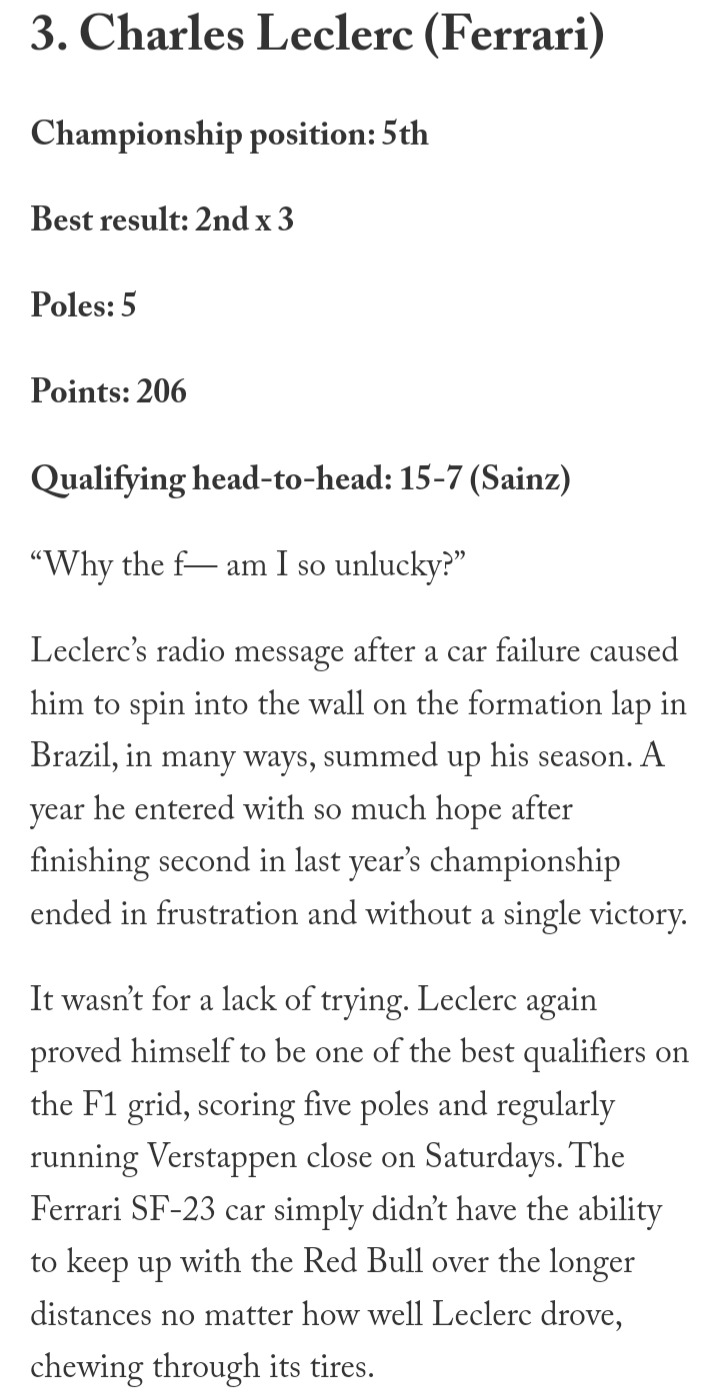
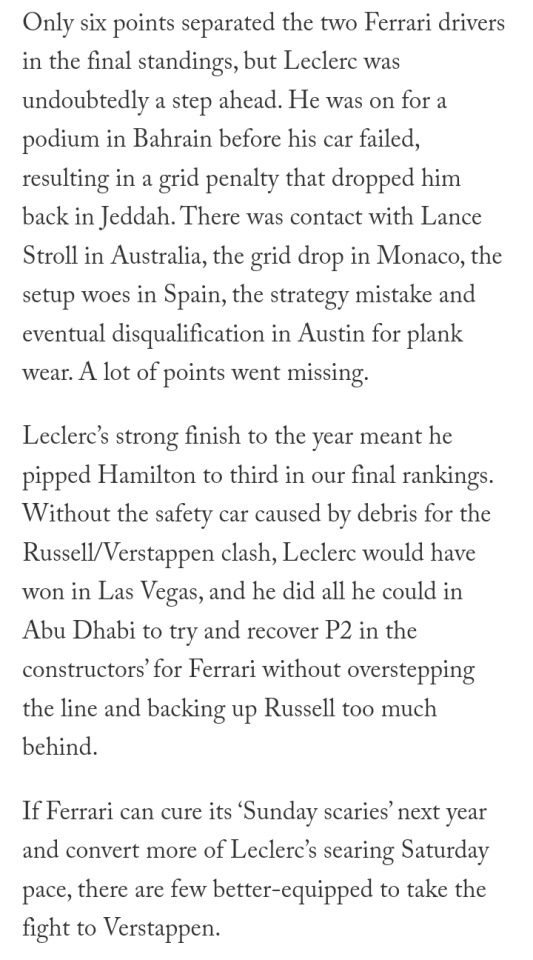
Source: The Athletic
#the last paragraph - yes and thank you#in case you're interested#athletic ranked norris number 2#and carlos 6th#charles leclerc#f1 2023 driver rankings#formula 1#f1#the athletic
71 notes
·
View notes
Text
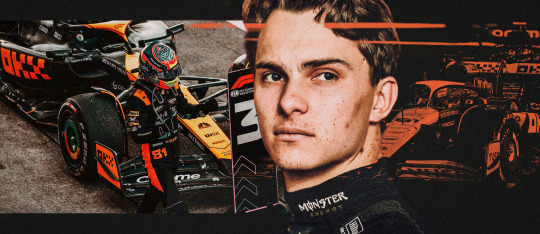
really feeling this header for the Athletic article
24 notes
·
View notes
Text
Reading the athletic article guessing nominees for NHL awards and they're sooooo stupid like... the Norris isn't best d-man its now just the defensemen that have the most points. And putting Auston Matthews up for Selke? Sure he does well but his teammate has literally taken shifts AS A DEFENSEMAN and wasn't considered????? Vezina is just win loss and save% ...I don't know it just seems like they don't even watch the game anymore just pick the big names with lots of points
15 notes
·
View notes
Text

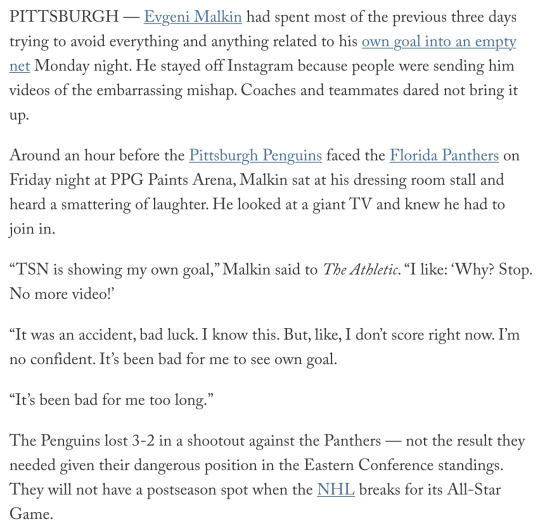
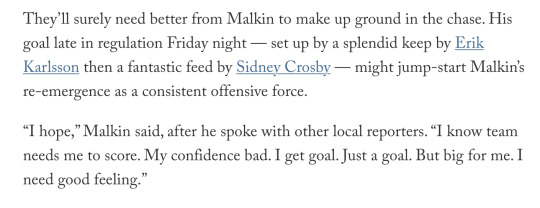

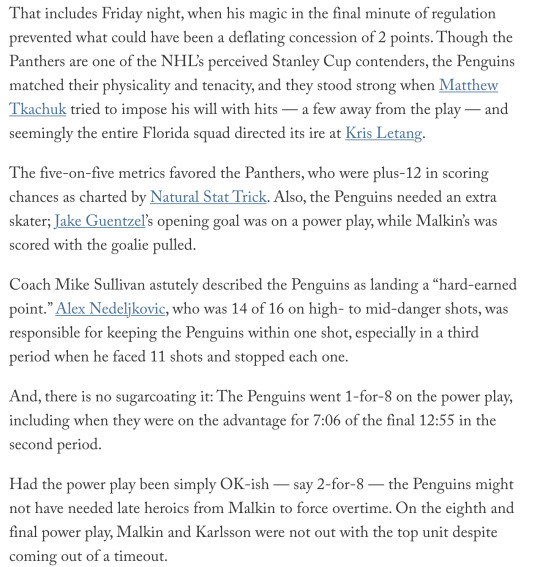
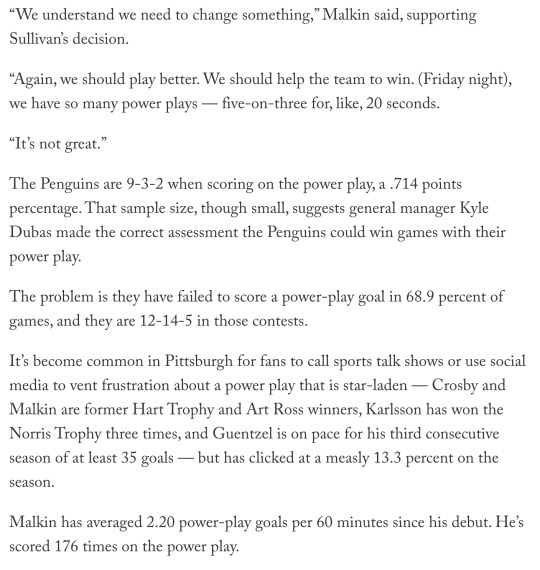


Geno being particularly hard on himself in Rossi's latest in The Athletic
12 notes
·
View notes
Photo
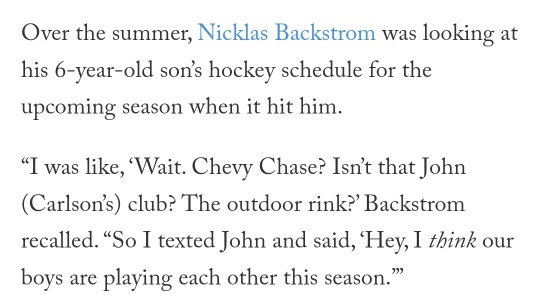

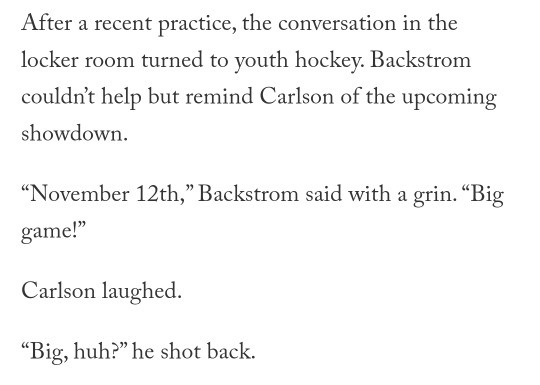
Inter-team Caps Dad showdown on the horizon...
#Okay but also someone pointed out they saw Carlson at his kid's 6AM practice the day after the Ottawa game#Which means he got. Like. Three hours of sleep tops.#No wonder he always looks like he needs a nap.#John Carlson#Nicklas Backstrom#Washington Capitals#Caps Dads#article#The Athletic
177 notes
·
View notes
Text
WHO SAID JASON ROBERTSON I WILL FIND YOU

10 notes
·
View notes
Text
7 notes
·
View notes
Text
If anyone has an Athletic account watch out for Mondays article by Ian Mendes. I did an interview had some pictures taken and had a chat with him and even let him take a picture of my signed pride puck
11 notes
·
View notes
Text
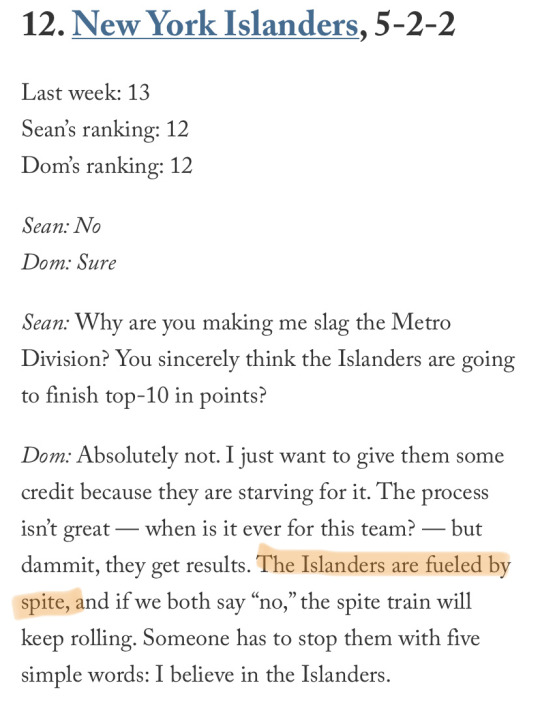
The Islanders are fueled by spite
#got a journalist to say he believes in us but only bc he thinks by doing so we’ll lose 😂😂😂😂🙃🙃🙃👍👍👍#new york islanders#islanders#isles#nhl#hockey#the athletic#islanders hockey. fueled by spite#who said spite was a bad motivator#also this feels classic ny/li#Sean gentille#dom Luszczyszyn#ny islanders
14 notes
·
View notes
Text

Don’t need to add anything ☠️☠️
#tfd#keep calm and pinoe on#megan rapinoe#soccer#football#woso#uswnt#the athletic#tournament of nations#2018
16 notes
·
View notes
Text
Quotes from Keith (& Matthew) on Matthew's playing style from The Athletic article in 2018
Before the whistle, after the whistle, during the play, it makes for a tantalizing target.
Mess of curls poking out of the helmet. Peach-fuzz patches decorating cheeks and chin. Mouthguard, bright white and chewed flat, dangling from his lip.

This poppable package often wears a deadpan expression, sometimes disdainful. But never ever guilty, despite his actions.
He may have nudged your goalie a period ago.
He may have shoved your top centreman.
He may have found your soft spot with his stick last month.
Yet Matthew Tkachuk refuses to hide. In fact, here he is, gliding to within striking distance.
Can you resist temptation?
“He has that face you just want to punch, according to other players,” said his father Keith, chuckling. “That to me is an effective player – a kid who’s engaged. Does it go a little bit overboard sometimes? Yeah. But guys are going after him because he’s engaged every game.
“I’m sure if I played against him, I’d go after him, too.”
“I definitely don’t go out of my way to say anything or do anything to people to put them off their game at all,” Matthew Tkachuk said with a straight face.
“My intention is to just go out there and play … all I’m trying to do is win.
“When you’re playing hard and producing, that’s when I’ve found that people get most frustrated at you.”
He claims that he’s no trash talker. (“I’m definitely not yappy.”) But that lack of verbal sparring can also work as an act of provocation to someone dying to mix it up.
“I just mind my business.”
No flopper – and thereby earning the benefit of the doubt from referees – Tkachuk has managed to draw 80 penalties in 125 career starts, the most of anyone over the past two seasons.
“As a hockey player, not just a dad, that’s a big thing,” said Keith, who, in 1,201 games, recorded 1,065 points and 2,219 penalty minutes. “It all comes down to his brain. I mean, he’s smart. He knows how to solve things. He knows how to put his body in a position where somebody might take a penalty.
“This kid, I find a lot of flaws in his game because I’m his dad, and that’s what dads do. But, at the end of the day, he wants to win.”
However, some observers, in light of suspensions – one game for spearing Toronto’s Matt Martin, one game for spearing Detroit’s Luke Witkowski, two games for elbowing Los Angeles’s Drew Doughty – would like to see Tkachuk tone down his act.
The kid hears the naysayers and their arguments, sure, but he’s not keen to relinquish his sandpaper approach.
“If I’m going out there and trying not to hit anybody or touch anybody and I play really soft, I’m definitely not at my best,” said Tkachuk, 6-foot-2, 202 pounds. “I feel like when I’m playing hard, playing with the puck, being strong on the puck, not giving it up, winning battles, that’s when I’m at my best.”
Keith, while not thrilled by the banishments, notes that his son has earned the right to figure out things on his own.
“I love the fact that he plays with an edge,” said Dad. “I told him that I’d rather see him sit out a game for being too aggressive than sit out a game because he’s soft.”
Keith – in one of his 53 big-league taffy pulls – scrapped with Ryan Kesler in 2006. Eleven years later, on Dec. 29, it was his son’s turn.
“He fought Kesler, he told me, because he felt like him and his team weren’t doing very well and he had to get into the game somehow,” said Keith. “I admire him for thinking that way. Because other guys might say, ‘I need a goal, I need a goal, I need a goal.’ But he tries to do many things to get engaged.
“I loved to play, I wanted to play. But I think he’s taken it to a whole new level.”
Clues were evident early.
Keith remembers his boy, as a habit, rising early to study the NHL Network’s highlight package.
“Bravo to him for doing that … most kids just want to get up, be miserable, eat their breakfast, and go to school,” said Keith, adding that not much has changed. “He watches hockey 24-7. He knows every player in the league. He wants to figure out every player in the league. He wants to know their tendencies. He’s a student of the game. That’s what I love about him.”
#matthew tkachuk#keith tkachuk#the athletic#nhl#matthew when he was a calgary flame#florida panthers#just the quotes from Keith & Matthew#there is more in the article#source in link
17 notes
·
View notes
Text
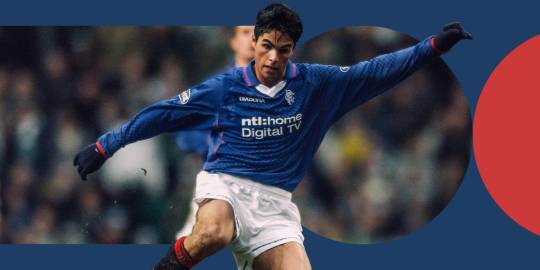
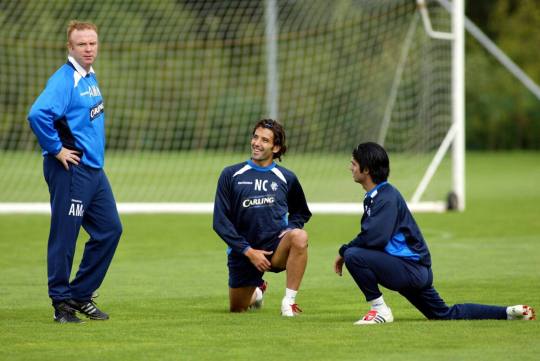


Mikel Arteta at Rangers and his title-clinching penalty: 'He pulled rank on everyone' - Jordan Campbell
As the go-karts whizzed around the chicane, each player was treated to the usual jeers and taunts from their Rangers team-mates waiting to race. Karting had become a regular team-building exercise for Rangers in the 1990s, but there was one unusual sight on this afternoon in 2002 that caused the rest of the squad to double-take.
“Mikel Arteta was driving one-handed. We couldn’t believe it,” laughs former Rangers full-back Maurice Ross.
“We gave him pelters at the time but, if we’re talking about coolness and being in control, then that was Mikel in a nutshell.”
His unassuming persona made an immediate impression, but fast forward to May 25 the following year and Arteta faces the most intense scrutiny of those qualities imaginable.
Heading into the final day of the 2002-03 season, Rangers and Celtic are neck and neck. Level on 94 points and inseparable on goal difference, the only column that differs is that Rangers have scored 95 and Celtic have scored 94.
It is a minor advantage, but with 92 minutes on the clock, Rangers 5-1 up at Ibrox against Dunfermline Athletic and Celtic 4-0 up at Rugby Park, that was still the only difference. A last-gasp goal for Celtic would see the helicopter carrying the trophy turn west to Kilmarnock.
Cue a 93rd-minute penalty to Rangers. All eyes are now on who would dare to be the hero.
Twenty-year-old Arteta. He casually strokes the ball into the bottom right corner, sending goalkeeper Derek Stillie the wrong way, and produces the most iconic of images with his celebration.

Shaking both of his hands wildly above his head, fingers splayed like a raptor, he sprinted towards the jubilant fans at the Copland Road end. He pulled down his shirt from the badge and threw a fist pump like an uppercut before being swarmed. Rangers were champions of Scotland for the 50th time.
“My brother-in-law gave me a picture of that moment and enlarged it. I’ve got it in a frame in my house. I can still hear the noise through it now,” his then-manager Alex McLeish tells The Athletic.
The mystery? How the baby-faced Spaniard, mostly seen and not heard, ended up with the ball in his arms.
He was in a team of big names including Lorenzo Amoruso, Arthur Numan, Barry Ferguson, Claudio Caniggia, Shota Arveladze, Ronald de Boer and Michael Mols. Only Caniggia and Mols were not on the pitch at that moment and even their replacements, 29-year-old Neil McCann and Scotland striker Steven Thompson, may have had cause to claim the ball.
Granted, Ferguson had missed two in one game against Dundee the month earlier, which saw Arteta take the third penalty and score, but under such pressure, it would have been natural to revert to authority.
“He pulled rank on everybody. Ronald must have said, ‘Let him take it, he’ll bury it’,” adds McLeish.
“Who, me?” asks De Boer. “No, he just took the ball. That says something about his personality.”
“No one argued. There was a confidence in him within our team. We had no doubt he was going to score,” adds Australian centre-back Craig Moore.
Within a year of joining from Barcelona, Arteta had earned the trust of his seniors and cemented his place in Rangers folklore.
How Rangers managed to lure him to Glasgow surprised even those who brokered the deal, but how his time in Scotland was limited to just two seasons — and a tale of two halves — is a source of frustration for some ex-team-mates.
(Second photo) Arteta (right) chats to Emerson (left), Nuno Capucho and Michael Mols in training (Photo: Alan Harvey/SNS Group via Getty Images)
His move only came about due to Rangers being drawn to face Paris Saint-Germain in the third round of the UEFA Cup in November 2001, which saw manager Dick Advocaat request a report from chief scout Ewan Chester. He went to watch PSG twice, away from home in freezing conditions, and returned with the message to look past the glamorous names. ‘Young Arteta is their most influential player’, his report read.
After two legs, in which Arteta delivered an outstanding performance at Ibrox, Rangers went through on penalties. It was a huge feat but when McLeish took over the next month, the talk was still about the boy with jet-black hair and blushed cheeks who had strolled around the pitch as if he owned it.
“He was so mature. You could immediately see he came from that Barcelona background. I thought, ‘Who is that guy?’,” De Boer tells The Athletic.
McLeish knew he had to use his finite resources wisely come the summer and so he sought counsel from two wise heads. His assistant Andy Watson provided a glowing review but McLeish sighed when he read his defined position was a holding midfielder.
“I knew right away that would be a problem as we had a phenomenal player of our own making in Barry Ferguson,” McLeish says.
“Could the two of them play together? Andy thought not. He said he was a nice footballer and never really got troubled in the game but it would probably be difficult for him in Scotland.
“So I got Ronald in the office and asked if he thought he could play in different positions. He said he could play anywhere and that he would be a tremendous signing.”
PSG had first refusal on him but Rangers splashed £6million on Arteta. They had finished the previous season strongly by winning both domestic cups, but Celtic had won back-to-back leagues.
There was not a huge influx of players to wrestle back the title, though. Kevin Muscat on a free was the only other signing. All the eggs had been placed in Arteta’s basket.
So when the Spaniard scored six minutes into his first Old Firm derby, a fixture that can define players good or bad, a few sighs will have been let out in the boardroom. “It’s as if you’re in a washing machine at a thousand miles per hour,” Arteta poetically described in 2019, after choosing it as the most ferocious derby he had played in.
(Third photo) McLeish (left) with Nuno Capucho and Arteta in training (Photo: Nick Ponty/SNS Group via Getty Images)
“I try to dictate play, but in that game, you can’t. Don’t even bother. It doesn’t stop. One touch, bam! Next touch, boof! Tackle, shot, corner, we go again! It’s nuts.”
McLeish’s assistant, Jan Wouters, had been a key figure in convincing Arteta he would fit in despite telling him to get ready for 90 minutes of being chased.
“He played his own game with one and two touches,” he says. “Sometimes, you don’t need words to see how important a player can be on the pitch. He took the lead by showing, ‘This is how we want to play, the combination play’.
“It’s a gift. You can learn but only if you have the talent for it. Players around him could see he was a fantastic player and that made it easy to accept if he said something.
“Players were physical with him but he could be mean if needed, too, don’t forget that. He would be tricky with it so no one noticed it.”
His own team-mates wanted to test his mettle and see if he was ready for the cauldron of Scottish football.
“He was quite slight, so in his first session I tried to go in and nick the ball from him,” says former full-back Maurice Ross.
“But he had this ability like a basketball player where they show it with one hand and then shift it to the other side of their body so you can’t see it or get round him. That was when you realised just how strong his legs were.
“It was normal to be roughed up. No one was given special treatment. Billy Dodds’ wife used to stay behind the training ground and one day she said, ‘What the hell was happening in training today with the noise?’. That was just Scotland boys vs the rest of the world. It was like a cup final most days, it was mental.”
Arteta’s ability won him respect instantly, but his team-mates speak of a player who appeared to be acutely aware of the hierarchy he had entered.
“He hardly spoke apart from the few he got close to as he was a quiet boy… but he had this stare,” says Ross.
“That can lead to people thinking, ‘Oh, he’s a bit mysterious, a bit deep, a bit aloof, maybe he doesn’t want to talk to us’. But he just didn’t get involved in the extra stuff and I admired him for that. It wasn’t bravado or forced, it was just this calm authority. He just knew he was the mustard.”
Arteta was friends with Argentinian winger Claudio Caniggia as they could speak in Spanish, and Georgian defender Zurab Khizanishvili says he and his wife often went for dinner with Arteta’s now-wife Lorena Bernal at popular Glasgow haunts O Sole Mio and Il Pavone.
They were both young and adjusting to the pressure and spotlight.
“At Rangers, you have to win every game. All I ever heard before a game in the dressing room was ‘three points’. Alex McLeish would say, ‘I don’t care how, I just need three points’, even if it was against Man United,” says Khizanishvili.
The person who got to know him best, though, was De Boer. Having spent a season at Barcelona in 1999 before joining Rangers, he felt duty-bound to make sure Arteta settled in Scotland.
“I had the father-son role,” says De Boer.
“Me and my wife took him everywhere with his girlfriend and got on really well, so I took him under my wing. He was a great son. Humble and always wanted to listen and learn.
“You saw some moments where you could see him maybe thinking, ‘What am I doing here?’. But there were other times I thought, ‘Jesus, he’s really stepping up now and doesn’t give in’.”
De Boer describes a little “shoulder rubbing” with Ferguson over who was seen as the main catalyst in possession, but Ross says their egos worked “silently in the background” to propel each other.
It was an interesting jigsaw as Ferguson was ‘Mr Rangers’, the heartbeat of the team who constantly demanded the ball incessantly and represented everything the club stood for in a city where symbolism is king.
“In the first season, we deployed Mikel on the left with the freedom to come inside and interact with Barry while supporting the front men,” says McLeish.
“It worked absolutely amazingly for us. Barry ran the show and Arteta was the playmaker coming in on his right foot. He was a revelation. If he had played central midfielder for us he would have been kicked all over the place.
(Fourth photo) Ferguson (second right) and Arteta learned to work together in midfield (Photo: Matthew Ashton/EMPICS via Getty Images)
“The game was tougher then — referees let you get away with a bit more. Celtic were a big strong team, so it may have been a bit too much in a defensive midfield role. We played him in the right position for that moment.”
Rangers won a domestic treble and Arteta played 35 times, scored five goals and looked every bit the superstar they were hoping he would be. But De Boer maintains that it still wasn’t the optimal solution.
“People said he couldn’t stand the physical part of the game, but I told people to give him time as I only learned what football really was at 20. He was a raw diamond, we just had to polish him,” says the Dutchman.
“In the beginning, it should have been 60 per cent Ferguson to demand the game and Mikel 40 per cent, but as his level progressed, by the end it should have been 60 per cent Mikel the playmaker as he had more skills.
“Barry was a tremendous player box to box but the real artistry was Mikel. They wanted to give Ferguson that role but that was a mistake in my eyes.”
Come the second season, that was a moot point. Arteta was now in a very different team.
It was widely appreciated that Rangers were looking to raise funds, but McLeish had half of his team gutted. Ferguson and Amoruso were sold to Blackburn Rovers, McCann moved to Southampton, Caniggia went to Qatar and Numan retired.
Half the senior starters exited and Rangers spent less than £1million on refreshing the squad as Sir David Murray attempted to cut the wage bill amid rising debts. Arteta even came out publicly to deny claims from Rangers executives that he had asked to go back to Spain.
“I was worried beforehand about the crowd’s reaction, but I love these fans,” Arteta said in August 2003 after a starring performance against Kilmarnock.
“I never said I would like to leave here in the first place. I only ever said that one day I would like to go back to Spain and it’s normal to want to return home sometime. But I am in no hurry. It would be impossible to leave now.”
He remained and took up the mantle from Ferguson at the heart of midfield, but Rangers were a shadow of the team from the previous season. They finished 17 points adrift of Celtic, losing all four league derbies, and failed to reach either of the domestic cup finals.
“This was his chance to play central midfield but I was playing a young cultured player who hadn’t been through the wars and learned to cope himself,” says McLeish.
“We put him to the forefront. Him and Stevie Hughes (a 22-year-old academy player) played in the middle of the park against Manchester United in the Champions League. They got a wee lesson that night against Roy Keane and Scholes but they were valuable.
“He was hugely respectful at all times. We gave him the perfect solution in the first season and a not-so-perfect one in the second season with a depleted squad. He didn’t quite have the shoulders to lean on.”
Arteta left for home at the end of his second season, moving to Real Sociedad for a fee below what Rangers paid for him. It was a crime that Rangers didn’t retain a player of his ability for longer — as De Boer believes they could have if the club had made him feel more important — or at least capitalise on that talent by making a profit.
The official line at the time was that he was homesick, but it was a curt goodbye for a young player who delivered the classiest of debut seasons. Had he stayed for longer, Arteta would have been held in the same esteem as many less talented foreign players are, but as Craig Moore knew after his first few sessions, this was a boy destined for the top.
This article is part of a series on Arsenal manager Mikel Arteta which will be published during the international break. The next feature is scheduled for Monday.
Artwork: Sam Richardson, using Getty Images
#Mikel arteta#Arsenal#Footieposting#Maybe I should create an athleticposting tag#The Athletic#I deffff reccomemd watching the clip of him scoring the pen I just didn't want to screen record and embed bc i always have trouble with vid#Start at like 1:34:23#If it doesn't start there from the link. Sorry#Also i added the Pic of him doing the celly#It just seemed like it needed to be there
26 notes
·
View notes
Text
NHL99: Sidney Crosby, icon of his era, never strays from his greater mission
It was 2016 in Minnesota and an aggravated coach Mike Sullivan was searching for the captain of the Pittsburgh Penguins following a loss to the Wild. Sullivan needed to speak with Sidney Crosby and was walking briskly on the event level of Xcel Energy Center.
Then, he stopped in his tracks.
Around the corner outside of the Penguins’ locker room, Crosby, minus his jersey but otherwise still wearing his equipment, was sitting on the floor. Speaking with a child in a wheelchair, Crosby sat so that he could better make eye contact. He often does this. Sullivan executed a U-turn while his captain sat with the child for 20 minutes, a scene that unfolds countless times across North America every season.
Thousands upon thousands of people have flocked to arenas for decades to watch Crosby play hockey since he was a boy. Crosby’s greater mission, though, has always been to comfort the sick and unlucky among us with an uncommon grace and thoughtfulness that is uniquely his own.
“There’s never been anyone like him before,” former Penguins general manager Jim Rutherford said. “And there will never be anyone like him after.”
The widely held belief that the world of professional sports doesn’t showcase any authentic role models is inaccurate so long as Sidney Patrick Crosby walks among us.
“You always hear that saying,” Bobby Orr said. “You know, that so and so is a better person than he is a player. Well, the great thing about Sid is, he’s one of the five greatest players in history. There’s no question about that. But he actually is a better person than he is a player. Now, think about that. I love him.”
At 35, Crosby is the hockey chief of the world, and he lands at No. 4 on The Athletic’s list of the greatest players of the modern era of the NHL. He has won three Stanley Cup championships, two Olympic gold medals, has registered 541 goals, 1,469 points and, quite remarkably, has lived up to every bit of the hype. His legacy is perfectly safe. He simply keeps going at this stage because he loves hockey and is obsessed with winning. Mike Babcock once called him a “serial winner,” which is the perfect description of Crosby. On and off the ice.
On the ice, he is a living legend. The massive legs, the impenetrable ability to protect the puck, the greatest backhand ever, the cannon-like burst of speed through the neutral zone, the rare playmaking ability, the tenacity, the intelligence, the determination, the precociousness as a teenager, the longevity as a thirty-something and the ability to score goals on hockey’s biggest stage are all indelible trademarks of his greatness.
The mythology of Crosby off the ice, however, may be even more worthy of inclusion in the history books and it is very much rooted in reality. He’s not just an ambassador for hockey, but an ambassador of kindness.
“He was like that even as a little boy,” said Troy Crosby, his father. “He was getting so much attention when he was little, and then as he became a teenager. It could have gone to his head. He could have gotten a big ego. All Sidney ever cared about was taking care of other people.”
It was evident from the very beginning.
Crosby made his NHL debut on Oct. 5, 2005, in New Jersey. It was a zoo after the morning skate. Hockey was back after a year-long lockout, Crosby’s debut was being made in the New York area against Hall of Fame goaltender Martin Brodeur and it was Mario Lemieux’s 40th birthday. While he was the center of attention, Crosby, who had turned 18 two months earlier, wasn’t concerned about himself.
“He was giving these interviews and there were people everywhere” said Tom McMillan, the former Penguins’ vice president of communications. “But he noticed, in the hallway outside of the locker room, that his mom was being surrounded by reporters. He was worried about her. She was fine, but he was worried about her. So he comes up to me and says, ‘Hey, can you make sure my mom is OK?’ From the very beginning, he was worried about everyone but himself. He never changed.”
Including his salary and endorsements, Crosby has earned in the neighborhood of $200 million in his career. His father isn’t the only one who says Crosby hasn’t changed. His teammates agree. Team employees agree. Even living legends like Orr agree.
There is a simple explanation for this, Crosby insists.
“I don’t think money ever gives you the vehicle to treat anyone differently or to be disrespectful,” he said. “I get to do what I love to do and I’m very appreciative of that. I don’t take that for granted one bit, regardless of what my pay is. I get to do what I love. The least I can do is treat people well along the way.”
Crosby’s legend in the Penguins organization is such that his contributions to society draw biblical comparisons.
Literally.
“I always say that he’s like a child of God,” former Penguins broadcaster Paul Steigerwald said. “That’s how I’ve always seen him. He has a certain light in his eyes that I always notice. He’s a genuinely good soul. People often give credit to a person’s parents for raising a great kid. I totally get that and they did a great job. But I also see a natural soulfulness to Sid that is innate and not necessarily learned.”
‘No child is ever left behind’
Charles Barkley once made considerable headlines for a Nike advertising campaign that stated, “I am not a role model.”
Crosby is a role model, and he knows it. He embraces it.
“I’ve been around a while and I’ve met a lot of people,” Rutherford said. “I’ve never met anyone like him. He only does things for the right reasons. And he cares about people so very much. Other players of his stature don’t always act like this. But he’s different. And you see it most when it comes to the way he treats children.”
The Penguins are the NHL’s oldest team, thus, many players have children. During the Stanley Cup years in 2016 and 2017, it was commonplace for Matt Cullen’s children to be hanging on Crosby after playoff wins, as they would naturally gravitate to the best player in the world who just happened to be the nicest guy in the room.
Crosby, in fact, has been known to have spirited mini-sticks games with Nikita Malkin. And yet, his treatment of children isn’t confined to the children of his teammates.
One story lives in Crosby lore.
It was Jan. 11, 2014. The Penguins had just won in Calgary, 2-1, in the weeks leading up to the 2014 Olympics in Sochi. After the game, the Penguins departed to their bus on a frigid Alberta evening.
While sitting on the bus, Crosby noticed a handful of teenagers standing behind a fence, which was located on a steep hill beside the Saddledome. They were chanting Crosby’s name and had signs wishing him well in the Olympics.
Upon seeing this, Crosby, dress shoes and all, sprinted up the steep, icy hill. He not only signed all of their jerseys but talked hockey with them for a few minutes before slowly coasting back down the hill.
“I’ll never forget seeing that,” Steigerwald said. “Who else does that?”
Not many people would do such a thing, it can be presumed. But Rutherford saw it every day while he was the general manager of the Penguins.
“The way he treats children is the single most impressive thing I’ve ever seen in my career,” Rutherford said. “When you see those groups of people who want autographs, you have to be careful. A lot of those groups have people that are there every day and looking to sell autographs. But I’ll tell you this about Sid: Never, not one time, has he ever passed by a child who wanted an autograph. No child is ever left behind. I’ve seen him sign autographs and then get on the team bus. Then, he sees a kid pop up who didn’t get his autograph signed. So, he always gets off the bus and makes sure the kid has an autograph and a picture with him. He understands the effect he has on people, but he’s the farthest thing from arrogant you could possibly imagine.”
Crosby is a regular at the UMPC Pittsburgh Children’s Hospital. While the Penguins do occasionally orchestrate team visits that Crosby naturally takes part in, he’s a regular at the hospital. He does so on his own time.
No cameras. No reporters. No attention.
“I’ll be honest with you,” Troy Crosby said. “That’s the way he wants it. It means a lot to him to spend time with kids, just him and the kids. He doesn’t want people knowing about it and he goes to lengths to keep it that way.”
Crosby seems miffed when others are blown away by his character. To him, to be polite, generous and thoughtful is simply natural.
“Treating people the right way has always been important to me,” Crosby said. “Whether it’s your teammates, people you see at the rink, fans, kids, whatever. You’re supposed to be good to people in life. You’re supposed to be respectful. So, that’s what I try to do every day. It’s always been a very important thing to me.”
On May 31, 2007, the Penguins made Crosby, then 19, the youngest captain in NHL history at that time.
The move seemed simple on the surface. He already had become the world’s greatest player and, as a teenager, had just claimed the Hart and Art Ross trophies. His maturity level was uncommonly advanced. He was already a rock star in Pittsburgh.
Easy choice, right?
“Not necessarily,” Crosby said. “It was quite uncomfortable, to be honest. I had never been a captain before.”
Say what?
Well, it makes sense. Crosby was only 16 and 17 when he played his junior hockey in Rimouski. In his younger days of hockey, he always played in older age groups because of his advanced performance. This was very much a new experience for him.
“I tried to learn things from other captains I had in the past and other people who had been captains,” he said. “But at the same time, I wanted to be my own person. I wanted to lead in a way that was natural to me. And you never stop learning. I’m still learning to be a captain to this day, honestly. But I think it was probably a good thing for me, looking back. It helped me grow.”
So did the presence of a fellow icon in the locker room.
Lemieux and Crosby played together in only 26 games before a heart condition forced the oft-injured Lemieux to finally retire for good. On the ice, they only had a few magical moments together, as they rarely played on the same line. Lemieux was slowing down and at the very end.
But before he left, he taught Crosby a few lessons.
“More than anything, he taught me how to stay calm. He was so, so even keeled,” Crosby said. “It didn’t matter what the score was, good or bad. Mario was always the same. He always looked the same, spoke the same. I watched him a lot and I saw how level-headed he was. I think that probably comes to him more naturally than it does to me. I’m probably more emotional than he is. I’m an emotional player. But he taught me how to find that sweet spot. Getting to play with him for a handful of games was a big deal for me.”
Crosby, many will tell you, is the best captain they’ve ever had.
“He’s unreal,” said one of the newest Penguins, Ryan Poehling. “When I got traded to Pittsburgh last summer, I had a text from him a couple of hours after the deal. I remember thinking that it was pretty incredible that Sidney Crosby is reaching out to me that quickly. Then you get to know him, and you immediately realize that this is a special person, that he’s different than anyone else. You can’t fake it. You’re born with what he has, the way he treats people.”
Nowadays, it’s understandable that young players would place Crosby on a pedestal. He’s not only one of the greatest players of all time, but he also treats them as equals.
What might be more noteworthy is that, even when Crosby was essentially a child, he had the respect of his locker room from the beginning.
“He was 22 when I signed in Pittsburgh,” Mike Rupp said. “He’s the best player in the world, this hotshot that everyone is talking about. I had absolutely no idea what to expect. … I could tell you so many nice stories about Sidney Crosby, and they’re all true. But what I realized right away was that, more than anything, Sid didn’t want to be treated differently than anyone else.
Given who he is, Crosby can’t possibly be one of the guys. It doesn’t work that way. He’s Crosby.
And yet, he is one of the guys.
“He just wanted to have fun. Wanted to play mini-golf on the road. He had that little kid smile. He wanted to play the handheld video games on planes,” Rupp said. “He likes to be one of the guys. I think what I’m saying is, he’s not a nerd. He’s not an introvert. But he wants nothing to do with the spotlight because he’s so damn humble. He’s the ultimate captain.”
When you’re a superstar in Pittsburgh, you have certain privileges. Lemieux and Jagr had their share of coaches fired. Some were certainly deserving, of course. But Crosby would never do such a thing. It simply isn’t his way.
He doesn’t demand his friends play with the Penguins. This, in no way, is a typical superstar.
“I was Sid’s GM for a long time,” Rutherford said. “And I can tell you, he never once complained to me about anything. He never once told me to fire anyone, or to trade anyone, or to get anyone in a trade. Never.”
Not until he was asked, anyway.
“Here’s how much respect I have for Sid,” Rutherford said. “At the end of each season, whether we had won the Cup or not, he and I would get together. I wanted his thoughts on certain players on the team and around the league. But he’d never tell me to get someone. He’d never be pushy or demanding. I’d ask him questions about people, and he would answer in his own very polite, very special way. That’s just the kind of man he is.”
Those who coached Crosby often had similar stories.
“He was a dream to coach,” Recchi said. “His relationship with Sully, you know, it’s really special. Those two have a bond. But for all of us on the staff, it was incredible coaching Sid. He asks you lots of questions. He wants your opinion. He’s not going to walk into your office and tell you what to do, or tell you what’s wrong. He asks so many questions and he loves feedback. Not many stars are going to be quite like that.”
Crosby has stated that he’d like to play for a few more seasons, perhaps until he is 40.
It’s unknown precisely when he will walk away or what he will do with his life once he hangs up his skates. Many in the hockey world hope Crosby will remain involved with the NHL in some capacity.
The hockey world, after all, couldn’t possibly be the same without him.
“He just makes you smile when you see him,” Rupp said.
Crosby entered our lives more than two decades ago, a child then. A man now.
A very, very good man.
“He’s just a nice person,” Steigerwald said. “A nice, nice person. The best of the best.”
29 notes
·
View notes
Text

On Washington Capitals’ big man Wilson: “He’s not a rat. I respect that. But I’d still like to punch him.”

16 notes
·
View notes
Text
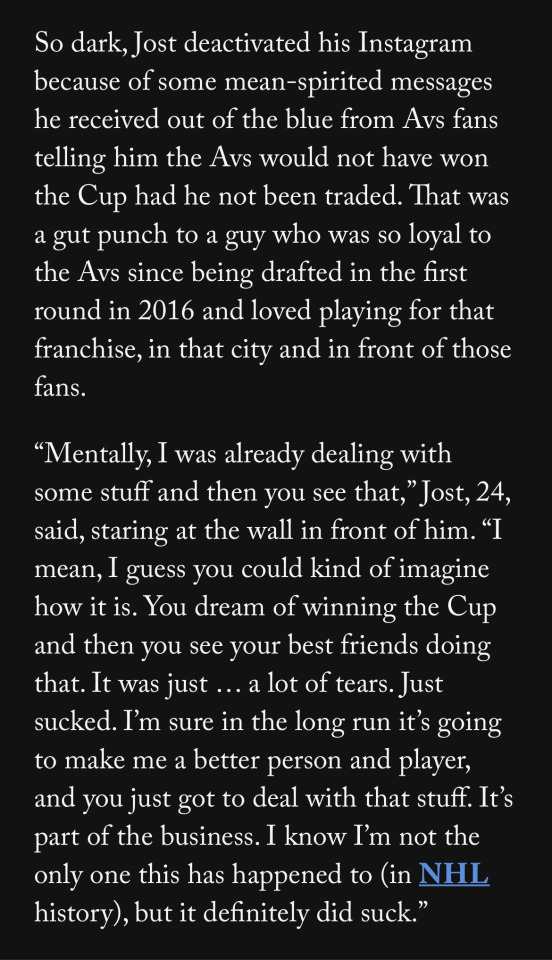
Who in the bloody hell would send messages like that to Tyson and actually call themselves an Avs fan? Humanity takes one on the chin here.
#tyson jost#nhl#nhl hockey#minnesota wild#i hate this#serious talk#nhl players#colorado avalanche#people suck#the athletic
53 notes
·
View notes